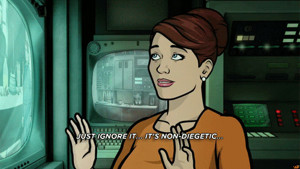Diegesis

In narrative story-telling, diegesis refers to things that are experienced by the characters within the story. Non-diegesis refers to things that are experienced by the audience, not the characters.
Example, if watching a movie:
Background music coming from a band playing in a bar as part of the story would be diegetic, because the characters are in the scene and can obviously hear music being played in the same “world” that they’re in
Background music on the movie’s soundtrack is non-diegetic, because the characters would not hear it in their “world”; it’s something only the audience can hear
Diegesis is the Greek word for “narration.”
In talking with some friends while writing this, we identified some interesting edge cases for issues of diegesis and soundtrack music:
In some cases, music goes from non-diegetic to diegetic. For example, in the James Bond movie The Living Daylights, we hear a song on the soundtrack, and when a character takes off his headphone, the music continues with a lower volume and different tone, indicating that the character was listening to the same song on his headphones “in” the story.
Music can be diegetic for one timeline and non-diegetic for others. If a character is listening to music and then we cut away to other scenes, but the music continues, then it’s diegetic (“in scene”) for the original character, but non-diegetic (“soundtrack”) for everyone else. The same would be true of narration. If a character is giving a speech, and the narrative cuts away but the speech continues, then the “diegetic-ness” of that speech changes with the perspective.
Why I Looked It Up
In an episode of Archer, Cheryl is alone and at a critical point in her subplot when an ominous rising musical score happens. At the time, she is in a locked room in a (large) helicopter, so there’s no way a set of violin players could be in the room with her. It’s clearly part of the background soundtrack of the show.
However, Cheryl raises her eyebrows and looks around, as if searching for the source of the music.
Later, it happens again, and she says (to herself):
Just ignore it, it’s non-diegetic…
It happens again later and she says:
God damn it, get out of my head John Williams!
(Referring to the famous composer of soundtracks).
Finally, it happens again a room full of people, and she says to everyone:
Please tell me you heard that.
In doing so, she’s breaking the fourth wall by taking non-diegetic music (the soundtrack) and experiencing it as diegetic, bringing into question the line between the character’s world and its representation as a fictional story.
(I read somewhere that Cheryl’s ability to hear the soundtrack of the show was a running gag, but I don’t remember it happening up to this episode.)
The entire plot of the movie Stranger Than Fiction revolved around this same idea.
The main plot follows […] an IRS agent who begins hearing a disembodied voice narrating his life as it happens – seemingly the text of a novel in which it is stated that he, the main character, will soon die – and he frantically seeks to somehow prevent his death.